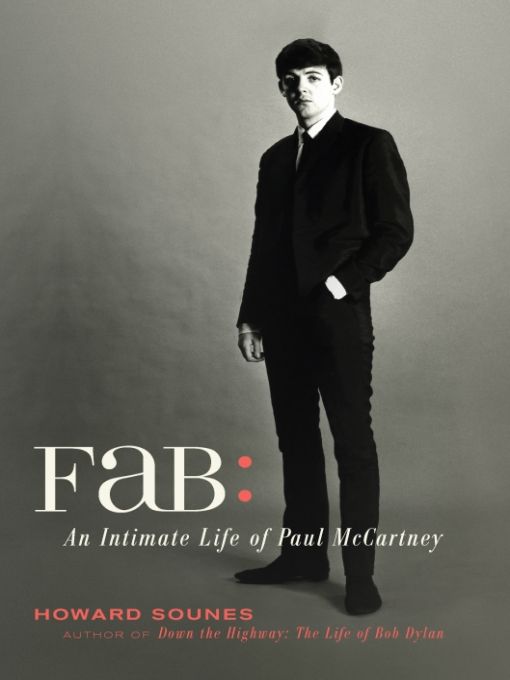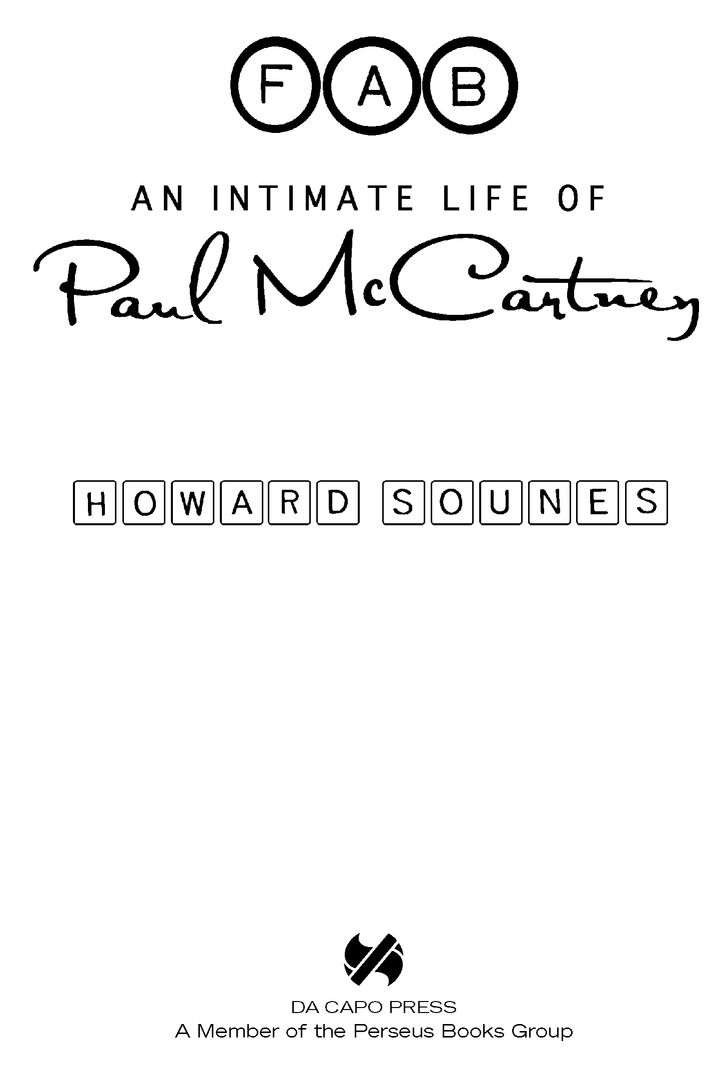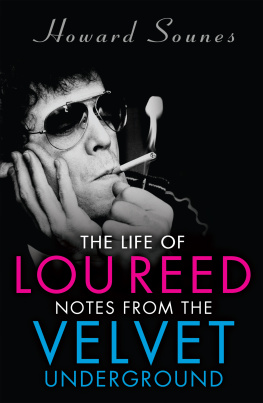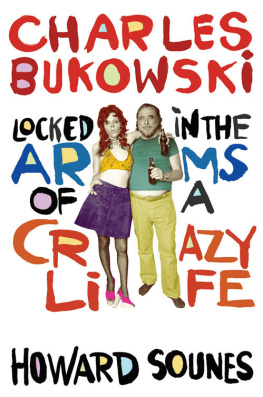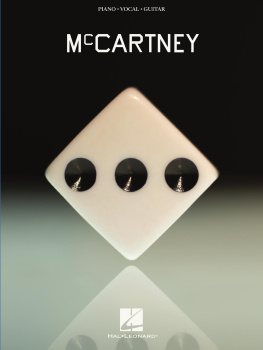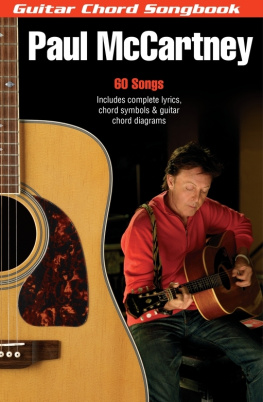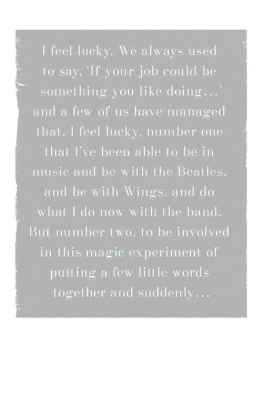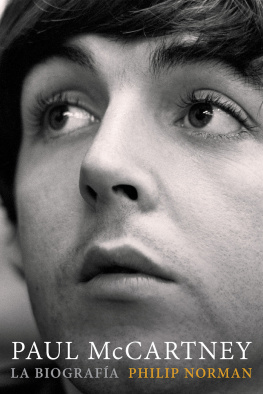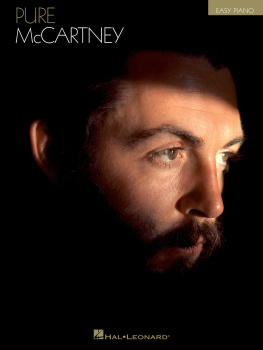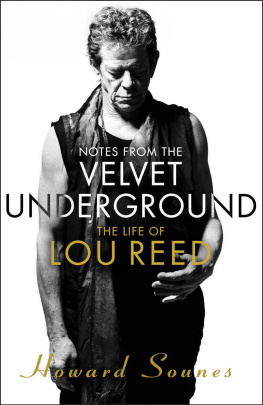Table of Contents
ALSO BY HOWARD SOUNES:
Down the Highway: The Life of Bob Dylan
Charles Bukowski: Locked in the Arms of a Crazy Life
Bukowski in Pictures
Seventies
Heist
Fred & Rose
The Wicked Game
To hear a playlist of music by Paul McCartney, chosen by the author and discussed in Fab, please visit www.fabplaylist.co.uk
PART ONE
WITH THE BEATLES
A LIVERPOOL FAMILY
AT THE START OF THE ROAD
They may not look much, Paul would say in adult life of his Liverpool family, having been virtually everywhere and seen virtually everything there is to see in this world. Theyre just very ordinary people, but by God theyve got something - common sense, in the truest sense of the word. Ive met lots of people, [but] I have never met anyone as interesting, or as fascinating, or as wise, as my Liverpool family.
Liverpool is not only the city in which Paul McCartney was born; it is the place in which he is rooted, the wellspring of the Beatles music and everything he has done since that fabulous group disbanded. Originally a small inlet or pool on the River Mersey, near its confluence with the Irish Sea, 210 miles north of London, Liverpool was founded in 1207, coming to significance in the seventeenth century as a slave trade port, because Liverpool faces the Americas. After the abolition of slavery, the city continued to thrive due to other, diverse forms of trade, with magnificent new docks constructed along its riverine waterfront, and ocean liners steaming daily to and from the United States. As money poured into Liverpool, its citizens erected a mini-Manhattan by the docks, featuring the Royal Liver Building, an exuberant skyscraper topped by outlandish copper birds that have become emblematic of this confident, slightly eccentric city.
For the best part of three hundred years men and women flocked to Liverpool for work, mostly on and around the docks. Liverpool is and has always been a predominantly white, working-class city, its people made up of and descended in large part from the working poor of surrounding Lancashire, plus Irish, Scots and Welsh incomers. Their regional accents combined in an urban melting pot to create Scouse, the distinctive Liverpool voice, with its singular, rather harsh pronunciation and its own witty argot, Scousers typically living hugger-mugger in the citys narrow terrace streets built from the local rosy-red sandstone and brick.
Red is the colour of Liverpool - the red of its buildings, its left-wing politics and Liverpool Football Club. As the city has a colour, its citizens have a distinct character: they are friendly, jokey and inquisitive, hugely proud of their city and thin-skinned when it is criticised, as it has been throughout Pauls life. For Liverpools boom years were over before Paul was born, the population reaching a peak of 900,000 in 1931, since when Liverpool has faded, its people, Paul included, leaving to find work elsewhere as their ancestors once came to Merseyside seeking employment, the abandoned city becoming tatty and tired, with mounting social problems.
Pauls maternal grandfather, Owen Mohin, was a farmers son from County Monaghan, south of what is now the border with Northern Ireland, and its likely there was Irish blood on the paternal side of the family, too. McCartney is a Scottish name, but four centuries ago many Scots McCartneys settled in Ireland, returning to mainland Britain during the Potato Famine of the mid-1800s. Pauls paternal ancestors were probably among those who recrossed the Irish Sea at this time in search of food and work. Great-grandfather James McCartney was also most likely born in Ireland, but came to Liverpool to work as a house-painter, making his home with wife Elizabeth in Everton, a working-class suburb of the city. Their son, Joseph, born in 1866, Pauls paternal grandfather, worked in the tobacco trade, tobacco being one of the citys major imports. He married a local girl named Florence Clegg and had ten children, the fifth of whom was Pauls dad.
Aside from Pauls parents, his extended Liverpool family, his relatives - what Paul would call the relies - have played a significant and ongoing part in his life, so it is worth becoming acquainted with his aunts and uncles. John McCartney was Joe and Flo McCartneys first-born, known as Jack. Pauls Uncle Jack was a big strong man, gassed in the First World War, with the result that after he came home - to work as a rent collector for Liverpool Corporation - he spoke in a small, husky voice. You had to lean in close to hear what Jack was saying, and often he was telling a joke. The McCartneys were wits and raconteurs, deriving endless fun from gags, word games and general silliness, all of which became apparent, for better or worse, when Paul turned to song writing. McCartney family whimsy is in Maxwells Silver Hammer and Rocky Raccoon, also Rupert and the Frog Song.
There was a son after Jack who died in infancy; then came Edith (Edie) who married ship steward Will Stapleton, the black sheep of the family; another daughter died in infancy; after which Pauls father, James, was born on 7 July 1902, known to all as Jim. He was followed by three girls: Florence (Flo), Annie and Jane, the latter known as Gin or Ginny, after her middle name Virginia. Ginny, who married carpenter Harry Harris, was Pauls favourite relative outside his immediate family and close to her younger sister, Mildred (Milly), after whom came the youngest, Joe, known as Our Bloody Joe, a plumber who married Joan, who outlived them all. Looking back, Joan recalls a family that was very clannish, amiable, witty people who liked company. In appearance the men were slim, smartly dressed and moderately handsome. Pauls dad possessed delicate eyebrows which arched quizzically over kindly eyes, giving him the enquiring, innocent expression Paul has inherited. The women were of a more robust build, and in many ways the dominant personalities. None more so than the redoubtable Auntie Gin, whom Paul name-checks in his 1976 song Let em In. Ginny was up for anything. She was a wonderful mad character, says Mike Robbins, who married into the family, becoming Pauls Uncle Mike (though he was actually a cousin). Its a helluva family. Full of fun.
Music played a large part in family life. Granddad Joe played in brass bands and encouraged his children to take up music. Birthdays, Christmas and New Year were all excuses for family parties, which involved everybody having a drink and a singsong around the piano, purchased from North End Music Stores (NEMS), owned by the Epstein family, and it was Jim McCartneys fingers on the keys. He taught himself piano by ear (presumably his left, being deaf in his right). He also played trumpet, until his teeth gave out, as Paul always says. Jim became semi-professional during the First World War, forming a dance band, the Masked Melody Makers, later Jim Macs Band, in which his older brother Jack played trombone. Other relatives joined the merriment, giving enthusiastic recitals of Youve Gone and Stairway to Paradise at Merseyside dance halls. Jim made up tunes as well, though he was too modest to call himself a songwriter. There were other links to show business. Younger brother Joe Mac sang in a barber-shop choir and Jack had a friend at the Pavilion Theatre who would let the brothers backstage to watch artists such as Max Wall and Tommy Trinder perform. As a young man Jim worked in the theatre briefly, selling programmes and operating lights, while a little later on Ann McCartneys daughter Bett took as her husband the aforementioned Mike Robbins, a small-time variety artiste whose every other sentence was a gag (Variety was dying, and my act was helping to kill it). There was a whiff of greasepaint about this family.

